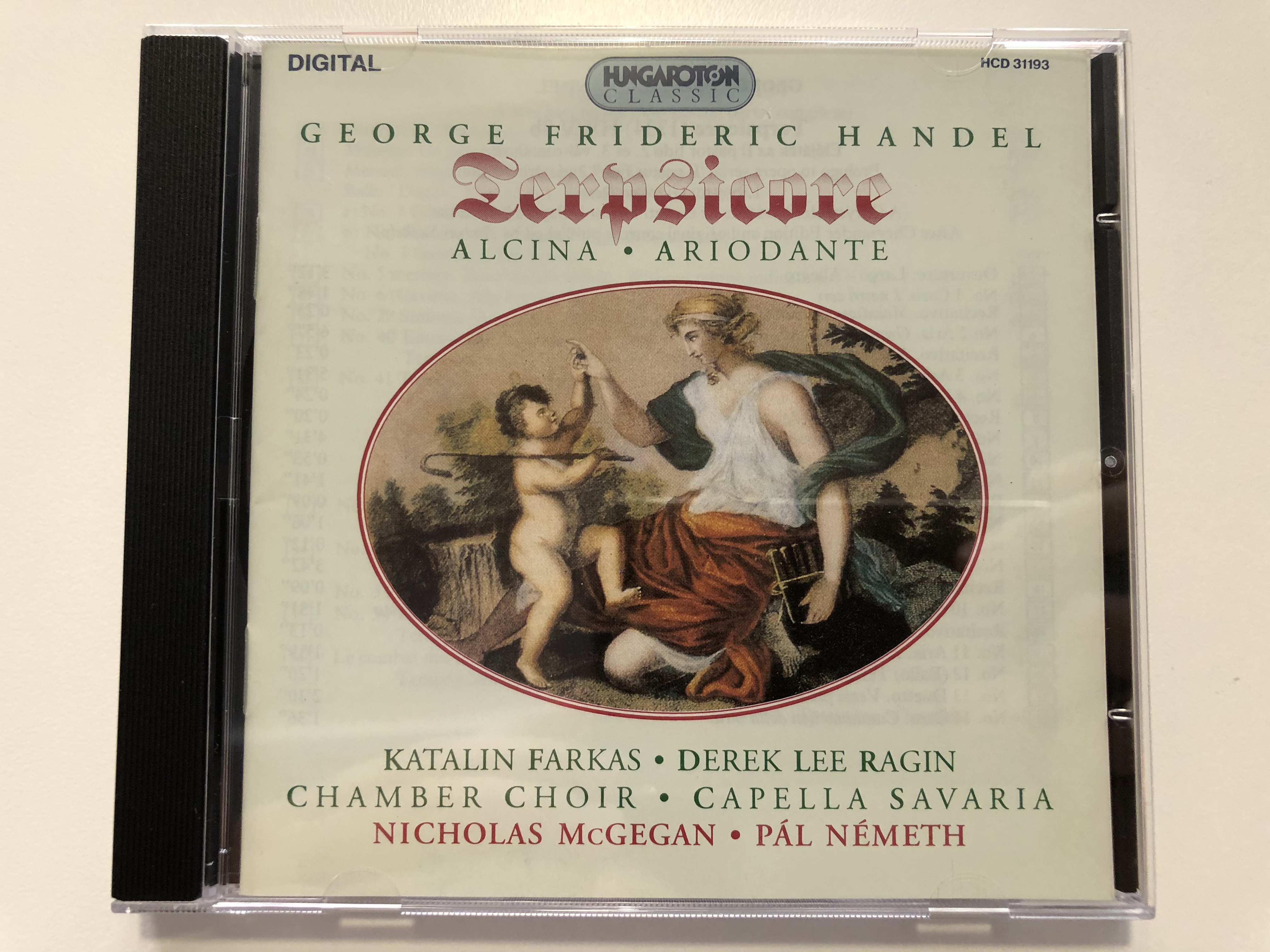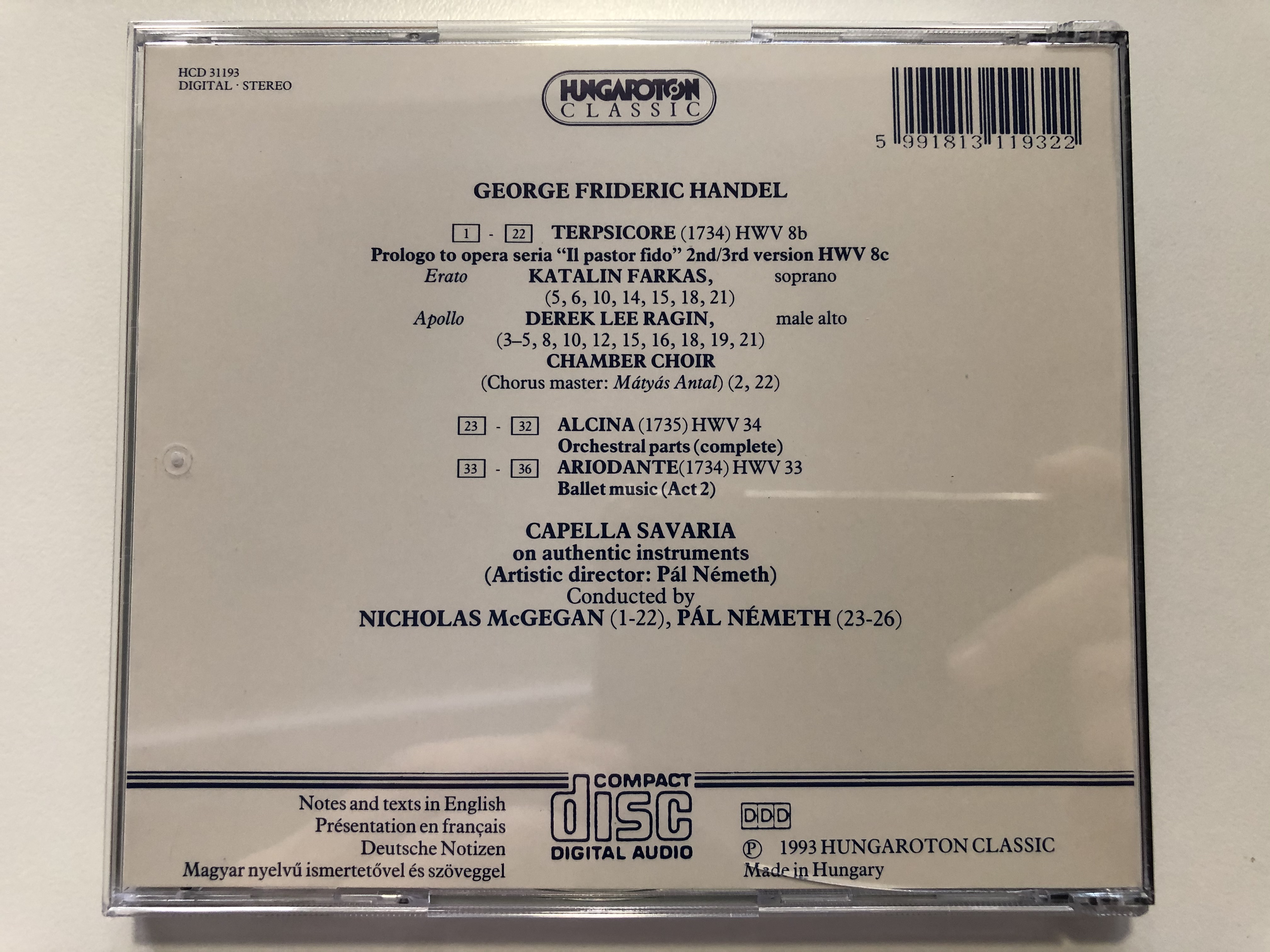Description
George Frideric Handel - Terpsicore, Alcina, Ariodante / Katalin Farkas, Derek Lee Ragin, Chamber Choir, Capella Savaria, Nicholas McGegan, Pal Nemeth / Hungaroton Classic Audio CD 1993 Stereo / HCD31193
Händel, Georg Friedrich: Terpsicore - előjáték az Il pastor fido című opera seriához; Alcina - zenekari részek (teljes); Ariodante - balettzene
UPC 5991813119322
George Frideric (or Frederick) Handel (/ˈhændəl/; baptised Georg Friederich Händel, German: [ˈɡeːɔʁk ˈfʁiːdʁɪç ˈhɛndl̩]); 23 February 1685 – 14 April 1759) was a German-born Baroque composer becoming well known for his operas, oratorios, anthems, concerti grossi and organ concertos. Handel received his training in Halle and worked as a composer in Hamburg and Italy before settling in London in 1712, where he spent the bulk of his career and became a naturalised British subject in 1727. He was strongly influenced both by the middle-German polyphonic choral tradition and by composers of the Italian Baroque.
Tracklist:
Terpsicore (1734) HWV 8b
1. Ouverture: Largo — Allegro 3:12
2. No. 1 Coro. I nostri cori 1:48
3. Recitativo. Melodiosa germana (Apollo) 0:25
4. No.2 Aria. Gran tonante (Apollo) 6°57”
5. Recitativo. Ma T. erpsicore snella, dov'è? (Erato, Apollo) 0:23
6. No.3 Aria. Di Parnasso i dolci accenti (Erato) 5:31
7. No. 4 Prelude: Larghetto 0:24
8. Recitativo. Ecco sen vien (Apollo) 0:20
9. No. 6 Chacconne: Tempéjelzés nélkiil / Without tempo indication 4:31
10. No. 6 Duetto. Col tuo piede (Apollo, Erato) 0:53
11. No. 7 Sarabanda: Largo assai 1°41”
12. Recitativo. Pingi is trasporti d’un amator (Apollo) 0:09
13. No. 8 Gigue: Presto 1°06”
14. Recitativo. La speme e cura d’un fido amor (Erato) 0:12
15. No. 9 Duetto. Tuo; passi son dardi (Apollo, Erato) 3:42
16. Recitativo. La gelosta, cieco il furor (Apollo) 0:09
17. No. 10 Air: Tempéjelzés nélkiil / Without tempo indication—un Poco più presto 1:31
18. Recitativo. Dai, quando vuoi (Erato, Apollo) 0:13
19. No. 11 Aria. Hai tanto rapido (Apollo) 1:59
20. No. 12 (Ballo) Tempéjelzés nélkiil / Without tempo indication 1:20
21. No. 13 Duetto. Vezzi più amabili (Apollo, Erato) 2:10
22. No. 14 Coro. Cantiamo lieti della Virtù 1:36
Alcina (1735) HWV 34
23. Ouverture: (Pomposa.) — Allegro 3:18
24. Musette: Un peu lentement 1:40
25. Menuet: allegro e forte (Allegro ma non troppo)
Ballo / Dance / Tanc (Act 1. Scene 2 / I. felv. 2. jel.) 0:56
26. a) No. 3 Gavotte: (Alla breve) 0:51
27. b) No. 4 Sarabande: Adagio (Tempo di Sarabanda)— 1:32
No. 3 Gavotte: (Alla breve) 1°32”
28. No. 5 menuet: Tempdjelzés nélkiil / Without tempo indication 1:52
29. No. 6 (Gavotte: Alla breve) 0:44
30. No. 29 Sinfonia (Act 3 / III. felv.): Allegro 0:51
31. No. 40 Entrée (Act 3 Last scene/ III. felv. Utols6 jelenet)
Tempojelzés nélkiil / Without tempo indication 2:00
32. No. 41 Tamburino (Act 3 Last scene / III. felv. Utolso jelenet)
Tempojelzés nélkiil / Without tempo indication 0:57
Ariodante (1734) HWV 33
33. No. 31 Entrée des Songes agréables:
Larg(hett)o e pian(issim)o 2:07
34. No. 32 Entrée des Songes funestes:
Tempojelzés nélkiil / Without tempo indication — 1:50
No. 33 Allegro
35. No. 34 Entrée des Songes agréables effrayés:
Tempòjelzés nélkil / Without tempo indication 0:54
36. Le combat des Songes funestes et agréables: 1:26
Tempojelzés nélkiil / Without tempo indication
- Soprano - Katalin Farkas
- Male alto - Derek Lee Ragin
- Choir - Chamber Choir
- Chorus master - Matyas Antal
- Conducted by - Nicholas McGegan, Pal Nemeth





































